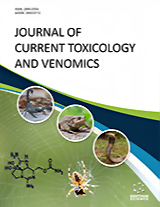Abstract
Background: Envenomation with Odontobuthus doriae scorpion results in pain at the bite site, inflammation, necrosis, and neurotoxicity. Administration of anti-scorpion antiserum prepared from immunized horses is the main therapy for envenomation. However, in some cases, anaphylactic shock related to antiserum administration limits its use. Therefore, the identification of the venom component and the development of a specific neutralizing agent is very important. Identification of linear epitopes of O. doriae using a peptide-displayed phage library (Ph.D.TM -7) was the main aim of the current study.
Methods: Three rounds of biopanning were performed on immobilized immunoglobulins (IgGs) isolated from the sera of an immunized horse. The biopanning process was checked by polyclonal phage enzymelinked immunosorbent assay (ELISA). Forty blue phage colonies were randomly selected from the third round of biopanning, amplified, DNA extracted and submitted for sequencing.
Results: Polyclonal phage ELISA results confirmed the progress of the biopanning process. The antigens involved in stimulating the horse's immune system were identified, namely sodium channel toxin, potassium channel toxin, chloride channel toxin, cell protein, venom protein, and antimicrobial peptide.
Conclusion: Identified epitopes promise further research to develop novel diagnostic or therapies against O. doriae envenomation.
[http://dx.doi.org/10.1016/S2222-1808(15)60867-2]
[PMID: 24250682]
[http://dx.doi.org/10.1124/mol.106.022970] [PMID: 16641312]
[http://dx.doi.org/10.1016/j.febslet.2005.06.052] [PMID: 16038905]
[http://dx.doi.org/10.1016/j.toxicon.2013.07.017] [PMID: 23916602]
[http://dx.doi.org/10.1016/j.toxicon.2016.11.247] [PMID: 27845058]
[http://dx.doi.org/10.1016/j.peptides.2013.10.021] [PMID: 24184590]
[http://dx.doi.org/10.1371/journal.pmed.0030184] [PMID: 16737347]
[http://dx.doi.org/10.1007/s00726-006-0485-9] [PMID: 17252308]
[http://dx.doi.org/10.1002/jmr.768] [PMID: 16680720]
[http://dx.doi.org/10.1186/1472-6807-7-64] [PMID: 17910770]
[http://dx.doi.org/10.2174/1573406410602060627] [PMID: 17105445]
[http://dx.doi.org/10.1016/S1567-5769(03)00016-X] [PMID: 12860175]









